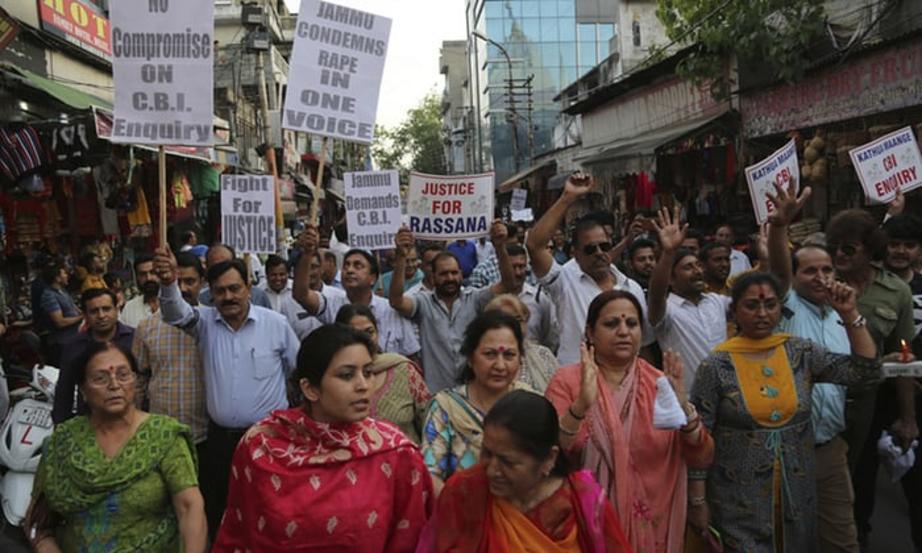India to introduce death penalty for child rapists
Prime minister approves executive order, which will apply to anyone convicted of raping a child under age of 12
India’s prime minister, Narendra Modi, will introduce the death penalty for rapists of girls under 12 years old, following an outcry over the latest sexual assaults to shock the country.
Modi convened an emergency cabinet meeting on Saturday to approve an executive order, or ordinance, that will amend India’s criminal law. The order will also force police to complete rape investigations within two months and extend maximum sentences for the rape of girls under 16 and women.
Using the order allows Modi to bypass parliament. It only needs to be signed by the Indian president to take effect.
Modi had come under pressure after two high-profile cases where senior officials in his rightwing Hindu nationalist Bharatiya Janata party (BJP) were accused of rape or of trying to prevent police investigations.
In January, Asifa Bano, an eight-year-old girl from Kathua in the state of Jammu and Kashmir, was abducted, drugged and raped in a small Hindu temple. After five days the girl, who was a member of a nomadic Muslim tribe, was killed with a rock.
When police officers tried to arrest the temple custodian, Sanji Ram, and seven other men, they were confronted by a group of protesters orchestrated by BJP officers and a state minister.
Last week Kuldeep Singh Sengar, a BJP member of the Uttar Pradesh state parliament, was arrested after he and his brother were accused of raping a 15-year-old girl. The family tried to register a case with police for months without success, then the girl tried to burn herself alive outside the chief minister’s residence. The next day her father died in police custody.
Modi failed to address either attack for several days, fuelling public anger. Critics said too little had been done to protect women and change attitudes after the gang rape and murder of Jyoti Singh in Delhi in 2012. The student, also known as Nirbhaya – Hindi for fearless – was attacked on a bus while travelling with her boyfriend and died 13 days later.
The chairwoman of the Delhi Commission for Women, Swati Maliwal, went on hunger strike nine days ago, saying that she would fast until the death penalty was introduced. “Until something concrete happens, I will not give up,” she said on Friday after the order was announced. “Until a system is there which ensures safety for the last girl, I won’t give up.”
However, the decision by Modi’s cabinet was criticised by opponents of the death penalty, which is already in force for other offences.
The Indian penal code, colonial-era legislation adopted after independence, allows the death penalty for murder, kidnapping, terrorism and treason, as well as a rape that leaves the victim in a persistent vegetative state. Since 2003, there have been three executions and 371 prisoners are on death row.
Asmita Basu of Amnesty International India said the order was “a knee-jerk reaction that diverts attention from the poor implementation of laws on rape and child protection.
“Studies have shown that most perpetrators are known to child victims,” she said. “Introducing the death penalty in such circumstances will only silence and further endanger children.”
The slow pace of justice is a significant obstacle in India’s attempt to deal with sexual assaults. Modi’s executive order calls for the mandatory completion of rape investigations within two months and for trials to last a maximum of the same period.
India launched fast-track courts after Singh’s murder in 2012 but they are struggling to cope with the volume of cases. There were 40,000 rapes reported in 2016, with children making up 40% of victims. The National Crime Records Bureau said in the same year only 28.2% of the child sexual abuse cases brought to trial had resulted in convictions.
It is common for court cases to last years or even decades – the longest civil case began in 1878 and has yet to be settled – because of a serious shortage of judges.
More than 1.6 million criminal cases that have been pending for more than 10 years. Around half the 18.9 million cases going through India’s district courts have been ongoing for more than two years.
One young woman spent 11 years bringing her attackers to justice after she was dragged into a car by a group of men at the age of 13 while walking home from her housemaid’s job in Lucknow. She went through six trials and endured more than 36 court appearances.
Abha Singh, a lawyer, said the executive order would deter men from committing crimes against women, but urged the government to set a timeframe for bringing suspects to justice. She added that the conviction rate in rape cases in India was just 28%.

